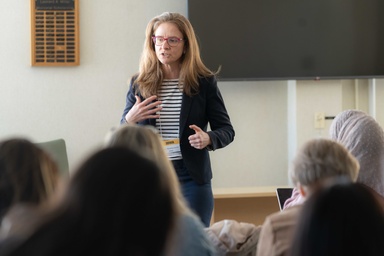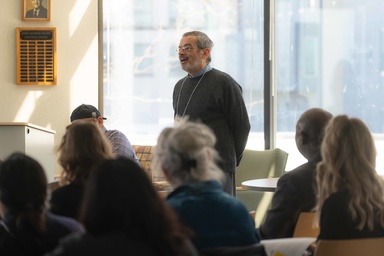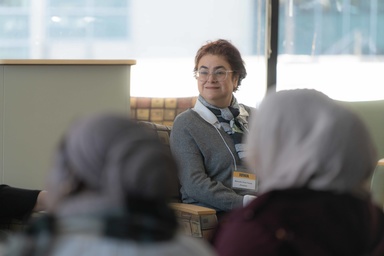More than 20 participants from across the state recently participated in a professional development summit to learn how to even better serve and support multilingual communities in Iowa.
The University of Iowa College of Education hosted community-based translators and interpreters in Eastern Iowa for a summit on professional development to support their work. Translators shared their experience and key practices for working in the field at the event, held on March 23.
The Summit on Community-Based Interpreting welcomed 26 participants from school districts, non-profits, and other community organizations who do not have formal training or certification in translation or interpretation, but who have been working as interpreters or translators in their community.
The summit was made possible because of a grant from the U.S. Department of Education to launch the National Resource Center for Translation and Global Literacy. With a grant of $1 million over four years – one of the largest humanities grants at Iowa – the center has worked to promote translation and global literacy across the University of Iowa – particularly among educators – to support faculty development and research and create a research hub and resource library for public use.

“When we wrote this grant, we knew that we wanted to do outreach to a number of different groups and one of the important ones was people who are doing the work in the community to support our multilingual communities,” says Pamela Wesely, College of Education associate dean and professor of multilingual education.
Wesely is the co-PI on the grant, working with Aron Aji, director of MFA in Literary Translation and an associate professor in the UI College of Liberal Arts and Sciences. Belén Hernando-Lloréns, an assistant professor of Multilingual Education in the College of Education, was the primary coordinator of the event.
“One of the most important things we have to remember is that our state is becoming increasingly diversified,” Aji says, “In the last five years we have doubled the population of heritage speakers in this state. Language is increasingly becoming an asset, and language justice is increasingly becoming a concern for us.”

In a panel at the summit, a group of community interpreters shared how they became translators and their approach to the work. The speakers had experience translating in hospitals and work settings, as well as school settings, such as during registration and parent-teacher conferences.
“I'm so glad to help the family, because I know the mom’s feelings when she came without learning English. I know that feeling. It is hard and very painful,” says Dhuha Mustafa, an Iowa City School District Community liaison.
“I think it is one of the most satisfying jobs I've ever done because I feel like I'm helping the immigrants to integrate to that community,” says Maricelle Pinto-Tomas, a lecturer at the University of Iowa and an interpreter for the Iowa City Community School District (ICCSD). “And I help the teacher to understand the parents that are in front of her, as well as the parent to communicate their anxiety about the education of their child.”

Beyond communicating across language barriers, translators stressed the importance of empathy, confidentiality, and creating cultural connections that build trust with the people with whom they work.
“It's not that people don't have voices, it's that the systems don’t allow those voices to be heard,” says Roberto Tijerina, the Center for Translation and Global Literacy 2024 resident, who moderated the panel.
The summit also featured a panel of speakers from ICCSD and local community organizations who work with multilingual populations. The group discussed how school systems can exclude English language learners and the changes they want to see.
“Our students who speak multiple languages, how are we empowering them to use their language and become interpreters and growing them and then introducing them to the programs here at the university so that they know that their language is not a deficit?” says Krystal Jossell-Morrison, the ICCSD learning supports senior specialist.
Jossell-Morrison says schools should empower language diverse students to use their language skills and connect them with organizations that require translation.
Renee Person, the principal at Kirkwood Elementary School, says English speaking educators must work to build connections and trust with non-English speakers despite language barriers.
“I must show up and do my due diligence to make sure that family knows that they are in a safe place, that we are human together,” Person says. “We may not have the same language that we're speaking, we have someone in the middle of us doing that work, but my eye contact is with that human in front of me.”
In addition to the panels, interpreters had a chance to meet with others working in the field.
“Participants were able to connect across our geographic area in ways that they had never been given the opportunity to do so before. We intend to cultivate further connections and encourage more advocacy for community-based interpreters and the populations that they serve,” says Wesely. “We worked to honor the community knowledge that exists everywhere around Eastern Iowa, and to give it the space to make connections and find power together.”
